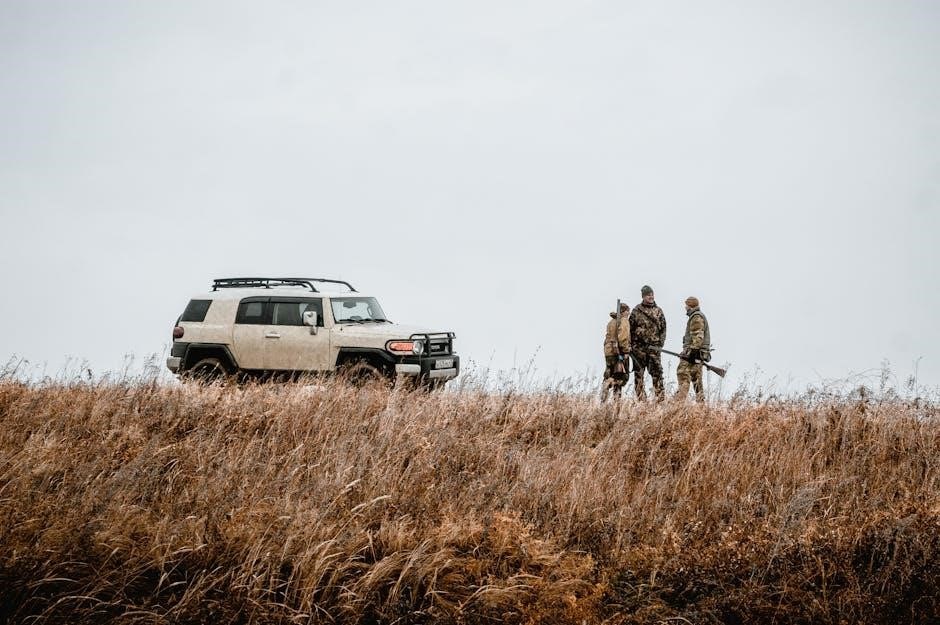A BSA Troop Guide is a mentor and advisor who helps new Scouts transition into troop operations. They are typically experienced Scouts holding the First Class rank or higher.
Overview of the Role and Responsibilities
The BSA Troop Guide serves as a mentor and advisor‚ primarily assisting new Scouts in understanding troop operations. They guide Scouts in developing skills‚ fostering teamwork‚ and navigating the Patrol Method. Responsibilities include introducing new members to troop traditions‚ supporting patrol leaders‚ and ensuring a smooth transition for Webelos Scouts. They also help maintain troop morale and encourage active participation in activities. This role is crucial for creating a supportive environment where Scouts can grow and succeed.
Key Duties of a BSA Troop Guide
A BSA Troop Guide mentors new Scouts‚ guiding them in troop operations and supporting patrol leaders. They help maintain high morale and ensure smooth troop functioning.
Introducing New Scouts to Troop Operations
A key responsibility of the Troop Guide is to welcome and integrate new Scouts into the troop. This involves explaining the troop’s structure‚ traditions‚ and expectations. The guide ensures newcomers understand how meetings are conducted‚ the role of patrols‚ and the importance of teamwork. By fostering a supportive environment‚ the Troop Guide helps new members feel comfortable and confident as they begin their Scouting journey.
Mentoring and Advising Patrol Leaders
The Troop Guide plays a crucial role in mentoring and advising Patrol Leaders‚ helping them develop leadership skills and confidence. They provide guidance on planning meetings‚ managing patrol activities‚ and resolving conflicts. By sharing their experience‚ the Troop Guide enables Patrol Leaders to effectively lead their patrols and contribute to the troop’s success. This mentorship fosters growth and prepares Patrol Leaders for greater responsibilities within the troop.
Assisting in Troop Meetings and Activities
Troop Guides actively support troop meetings and activities by assisting with planning‚ setup‚ and execution. They help ensure events run smoothly‚ guide Scouts during activities‚ and promote engagement. By contributing to a well-organized and productive environment‚ Troop Guides enhance the overall Scouting experience‚ fostering teamwork and skill development among all members. Their involvement is essential for creating meaningful and enjoyable troop functions.

Leadership and Mentorship in the Troop
The BSA Troop Guide plays a crucial role in fostering leadership and mentorship‚ guiding Scouts to develop skills and confidence while promoting a positive troop culture.
Qualities of an Effective Troop Guide
An effective Troop Guide is patient‚ knowledgeable‚ and approachable‚ serving as a role model for Scouts. They demonstrate strong communication skills‚ empathy‚ and the ability to inspire confidence. A good Troop Guide is organized‚ experienced‚ and passionate about Scouting‚ fostering a positive environment for growth and development. They must also be adaptable‚ ensuring new Scouts feel welcomed and supported as they integrate into troop activities and leadership roles.
Building Relationships with Scouts and Leaders
Building strong relationships is crucial for a Troop Guide. They foster trust and respect by engaging with Scouts‚ understanding their needs‚ and offering guidance. Collaborating with patrol leaders and adult advisors ensures a unified approach to troop success. Effective communication and active listening help create a supportive environment‚ enabling Scouts to thrive and leaders to work cohesively toward common goals. Positive interactions strengthen the troop’s overall morale and effectiveness.
Resources for Troop Guides
The essential resources for Troop Guides include the Scouts BSA Troop Leader Guidebook‚ online tools‚ and the Guide to Safe Scouting‚ providing necessary tools and guidelines.
Scouts BSA Troop Leader Guidebook
The Scouts BSA Troop Leader Guidebook is a comprehensive resource designed for both new and experienced leaders. It provides detailed insights into troop operations‚ leadership strategies‚ and program planning. Volume 1 covers the basics of troop leadership‚ while Volume 2 offers advanced guidance. This guidebook is essential for understanding the responsibilities and rewards of leading a Scouts BSA troop effectively.
Online Tools and Publications
Scouts BSA offers a variety of online tools and publications to support troop guides and leaders. Resources include the Scouting magazine‚ which provides insights and tips for effective leadership. Additionally‚ websites like Scoutingevent.com offer event planning tools and guides. The Guide to Safe Scouting is another essential resource‚ outlining safety protocols for all activities. These publications and tools are designed to help troop guides mentor scouts effectively‚ plan engaging meetings‚ and ensure a safe and successful scouting experience.

The Patrol Method and the Troop Guide
The Patrol Method is a cornerstone of Scouting‚ emphasizing teamwork and leadership within small groups. The Troop Guide plays a key role in fostering this method by mentoring Patrol Leaders and ensuring new Scouts integrate smoothly into the troop structure‚ promoting collaboration and skill development.
Understanding the Patrol Method
The Patrol Method is a core concept in Scouting where Scouts are divided into small‚ self-governing groups called patrols. Each patrol‚ typically consisting of 5-10 members‚ functions as a team‚ fostering camaraderie‚ accountability‚ and leadership development. Patrols are led by a Patrol Leader‚ who is supported by an Assistant Patrol Leader‚ with guidance from the Troop Guide. This structure encourages Scouts to take ownership of their activities‚ learn problem-solving skills‚ and build strong interpersonal relationships. Effective implementation of the Patrol Method ensures that Scouts develop essential life skills in a supportive and collaborative environment.
The Troop Guide’s Role in Patrol Leadership
The Troop Guide plays a crucial role in fostering effective patrol leadership. They serve as a mentor and advisor to Patrol Leaders‚ helping them develop decision-making and problem-solving skills. By guiding new Scouts through troop operations and fostering teamwork‚ the Troop Guide ensures a smooth transition into the patrol structure. Their experience and knowledge enable Patrol Leaders to lead confidently‚ while their support helps maintain the Patrol Method’s integrity‚ promoting a collaborative and growth-oriented environment within the troop.

Troop Guide Training and Development
Troop Guides undergo leadership training programs and mentorship from experienced Scouts‚ ensuring they’re well-equipped to guide new members effectively and foster a supportive troop environment.
Leadership Training Programs
BSA offers structured leadership training programs for Troop Guides‚ including national camps and local council workshops. These programs focus on developing skills like communication‚ problem-solving‚ and decision-making. Experienced Scouters and mentors provide guidance‚ helping Troop Guides become effective leaders. The training emphasizes patrol method principles and team building. Additionally‚ resources like the Scouts BSA Troop Leader Guidebook support ongoing development. These programs ensure Troop Guides are well-prepared to mentor new Scouts and contribute to a successful troop environment.
Experienced Scouts as Mentors
Experienced Scouts play a crucial role as mentors‚ sharing knowledge and guiding younger Scouts. They serve as role models‚ demonstrating Scout spirit and leadership. By mentoring‚ they reinforce their own skills while fostering a supportive troop culture. This hands-on approach ensures new Scouts integrate smoothly and develop essential skills. The mentorship dynamic strengthens Scout-to-Scout relationships‚ building confidence and teamwork within the troop.

The Evolution of the Troop Guide Role
The Troop Guide role has historically focused on mentoring new Scouts‚ with responsibilities expanding over time to include leadership development and fostering troop unity.
Historical Context of the Position
The Troop Guide role originated to help new Scouts integrate into troop life‚ fostering a smooth transition and preserving the patrol method. Historically‚ experienced Scouts took on this mentorship role‚ ensuring continuity of leadership and traditions within the troop. Over time‚ the role evolved to include guidance for patrol leaders‚ reinforcing teamwork and responsibility. This position remains vital in maintaining the troop’s structure and promoting Scout advancement. Its legacy reflects the core values of Scouting‚ emphasizing leadership‚ mentorship‚ and unity.
Adapting to Inclusion of Female Scouts
The BSA Troop Guide role evolved significantly with the inclusion of female Scouts in 2019. Troop Guides now mentor both male and female patrols‚ ensuring seamless integration and fostering unity. This shift required adaptability in leadership styles and communication to accommodate diverse perspectives. Female Scouts and leaders have embraced the role‚ inspiring others and demonstrating the values of Scouting. The Troop Guide’s role remains pivotal in fostering inclusivity‚ ensuring all Scouts thrive within the patrol method‚ regardless of gender; This change has enriched troop dynamics and broadened opportunities for leadership growth.
Safety and Policies in Troop Guidance
Troop Guides ensure adherence to the Guide to Safe Scouting Practices and BSA policies‚ fostering a secure environment for all Scouts and leaders while promoting accountability.
Guide to Safe Scouting Practices
The Guide to Safe Scouting Practices outlines essential safety measures for all BSA activities‚ ensuring a secure environment for Scouts and leaders. It covers topics like first aid‚ emergency preparedness‚ and health standards. Troop Guides must familiarize themselves with these guidelines to prevent accidents and respond appropriately if incidents occur‚ promoting a culture of safety within the troop. Compliance with these practices is crucial for protecting everyone involved.
BSA Policies for Adult Leaders
BSA policies for adult leaders emphasize safety‚ inclusivity‚ and proper conduct. Leaders must undergo background checks‚ complete training‚ and adhere to the Scout Oath and Law. The organization allows church-sponsored troops to set specific policies for adult leaders while maintaining national standards. Compliance with these policies ensures a safe and structured environment for Scouts‚ fostering trust and accountability within the troop. These guidelines are detailed in the Scouts BSA Troop Leader Guidebook and other official resources.

Troop Guide’s Role in Scout Advancement
The Troop Guide plays a key role in aiding Scouts’ advancement by providing guidance‚ resources‚ and encouragement‚ helping them progress through ranks and achieve their goals effectively.
Supporting Scouts in Earning Ranks
Troop Guides play a vital role in helping Scouts progress through the ranks by guiding them through requirements‚ encouraging participation‚ and providing resources. They ensure Scouts stay motivated‚ informed‚ and supported throughout their journey‚ fostering a deeper understanding of Scouting principles and skills. By offering mentorship and connecting Scouts with necessary tools‚ Troop Guides help youth achieve their full potential and advance successfully in the program.
Encouraging Participation in Merit Badges
Troop Guides motivate Scouts to explore merit badges‚ helping them discover new interests and skills. They guide Scouts in selecting badges‚ connecting them with merit badge counselors‚ and tracking progress. By fostering enthusiasm and providing resources‚ Troop Guides ensure Scouts gain confidence and knowledge in various fields‚ from STEM to outdoor skills‚ enriching their Scouting experience and personal growth.

Recognizing the Contributions of Troop Guides
Troop Guides are vital mentors whose dedication and leadership significantly impact troop success. Their efforts are recognized through awards‚ earning respect and gratitude from Scouts and leaders alike.
Awards and Recognition for Troop Guides
Troop Guides are honored with various awards for their dedication and mentorship. These include the Scouting Service Award and the Unit Leader Award of Merit. Recognitions highlight their key role in fostering leadership and Scout development‚ encouraging continued commitment to mentoring. Such awards not only acknowledge their efforts but also inspire other Scouts to follow in their footsteps‚ creating a culture of appreciation within the troop.
Impact on Troop Success and Morale
Troop Guides significantly enhance troop success by fostering a positive and inclusive environment. Their mentorship boosts new Scouts’ confidence‚ encouraging participation and teamwork. By guiding patrols and supporting leaders‚ they ensure smooth troop operations and high morale. Their dedication inspires others‚ creating a culture of collaboration and shared achievement. The Troop Guide’s efforts directly contribute to the troop’s overall success and strengthen the sense of unity among members‚ making them indispensable to the Scouting experience.